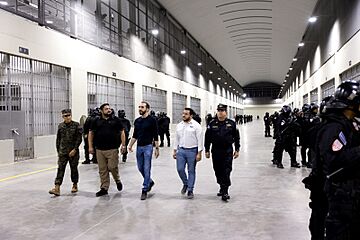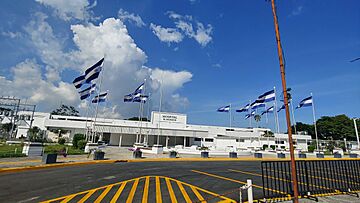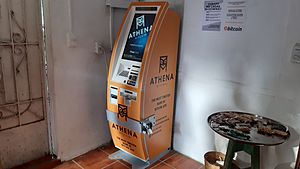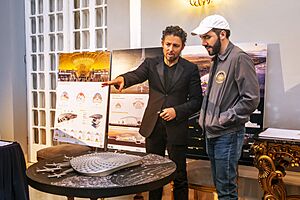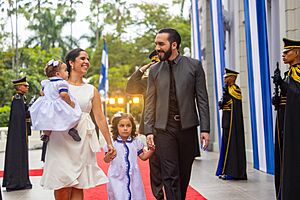Nayib Bukele facts for kids
Quick facts for kids
Nayib Bukele
|
|
|---|---|
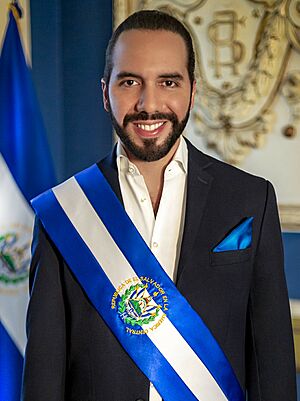
Official portrait, 2019
|
|
| 81st President of El Salvador | |
| Assumed office 1 June 2019 |
|
| Vice President | Félix Ulloa |
| Preceded by | Salvador Sánchez Cerén |
| Mayor of San Salvador | |
| In office 1 May 2015 – 30 April 2018 |
|
| Preceded by | Norman Quijano |
| Succeeded by | Ernesto Muyshondt |
| Mayor of Nuevo Cuscatlán | |
| In office 1 May 2012 – 30 April 2015 |
|
| Preceded by | Álvaro Rodríguez |
| Succeeded by | Michelle Sol |
| Personal details | |
| Born |
Nayib Armando Bukele Ortez
24 July 1981 San Salvador, El Salvador |
| Political party | Nuevas Ideas (since 2017) |
| Other political affiliations |
|
| Spouse |
Gabriela Rodríguez
(m. 2014) |
| Children | 2 |
| Parent |
|
| Education | Central American University (no degree) |
| Occupation | Politician, businessman |
| Cabinet | Cabinet of Nayib Bukele |
| Signature | |
Nayib Armando Bukele Ortez (born 24 July 1981) is a Salvadoran politician and businessman. He has been the 81st president of El Salvador since 2019.
Before becoming president, Bukele worked in advertising and business. He started his political career in 2012 as the mayor of Nuevo Cuscatlán. Later, he became the Mayor of San Salvador in 2015. In 2017, he left his political party and created a new one called Nuevas Ideas. He ran for president in 2019 and won with 53 percent of the votes.
As president, Bukele launched a plan to reduce crime and gang violence in El Salvador. This plan has led to a big drop in the country's crime rate. He also made bitcoin a legal currency in El Salvador in 2021. Bukele is very popular in El Salvador and in other parts of Latin America. He was re-elected president in 2024 with a large majority of votes.
Contents
Early Life and Career
Nayib Armando Bukele Ortez was born in San Salvador, El Salvador, on 24 July 1981. His father, Armando Bukele Kattán, was a businessman. His mother is Olga Marina Ortez. Nayib has three younger brothers and several half-siblings. His family has different religious backgrounds, including Islam, Catholicism, and Greek Orthodox. His grandparents came to El Salvador from Jerusalem and Bethlehem.
Bukele finished high school in 1999. He briefly studied law at Central American University but left to work in advertising. He founded his own marketing company, Obermet, in 1999. He also led Yamaha Motors El Salvador, a company that sells Yamaha products.
Early Political Career
Mayor of Nuevo Cuscatlán
In 2011, Bukele decided to enter politics. He joined the Farabundo Martí National Liberation Front (FMLN) party in 2012. He successfully ran for mayor of Nuevo Cuscatlán, a town near San Salvador. He won the election in March 2012 and became the youngest mayor in the country.
As mayor, Bukele started a scholarship program for young people. He donated his own salary to help fund it. He also launched a project called Sphere PM. This project used a high-altitude balloon to take pictures of El Salvador. Its goal was to encourage young people to study science and technology. Bukele also spoke at the United Nations about his projects.
Mayor of San Salvador
In 2014, Bukele announced he would run for Mayor of San Salvador, the capital city. He won the election in March 2015 and took office in May.
As mayor of San Salvador, Bukele worked to improve the city's historic downtown area. He started a campaign called "San Salvador 100% Illuminated" to add lights to every corner of the city. This was done to help reduce crime. He also installed video cameras in areas with high crime rates. Bukele opened the Cuscatlán Market to help street vendors move their businesses. He also renovated the Gerardo Barrios Plaza downtown.
Bukele continued his scholarship programs for youth in San Salvador. He also started the My New School project to update primary schools. He worked with mayors from other countries, like Panama City and Washington, D.C., to share ideas for city development. He also visited Taipei and Jerusalem.
Leaving the FMLN
Bukele's relationship with the FMLN party became difficult after he became mayor of San Salvador. He often disagreed with party leaders. In September 2017, a party member accused Bukele of insulting her. Bukele did not attend a party meeting to discuss the issue. On 10 October 2017, he was removed from the FMLN party. The party said he had disrespected women's rights and party rules.
After leaving the FMLN, Bukele founded his own political party, Nuevas Ideas, in October 2017.
2019 Presidential Election
Many people thought Bukele would run for president in 2019 because of his popularity as mayor. He announced his intention to run for president in October 2017. He said Nuevas Ideas would work to remove the two main political parties, ARENA and FMLN, from power.
Bukele used social media a lot during his campaign. He communicated directly with his supporters on Facebook, Instagram, and Twitter. He promised to fight corruption, create jobs, and reduce crime.
His new party, Nuevas Ideas, needed to be officially registered to run in the election. However, Bukele believed the Supreme Electoral Court would not register it in time. So, he joined another party, the Grand Alliance for National Unity (GANA), and became their presidential candidate. He chose Félix Ulloa as his running mate for vice president.
On election day, 3 February 2019, Bukele won the election with 53.1 percent of the votes. He was the first presidential candidate in a long time who was not from the ARENA or FMLN parties to win.
Presidency
Inaugurations
Bukele's first presidential inauguration was on 1 June 2019. He became the 81st president of El Salvador and the youngest at 37 years old. He held the ceremony at the National Palace. This was different from past presidents who used the Legislative Assembly building. Bukele wanted to show that his presidency was focused on the people.
His second inauguration was also held at the National Palace on 1 June 2024. He called it "the most important moment in our recent history."
Reducing Crime
One of Bukele's main promises was to end gang violence in El Salvador. The country had been one of the most dangerous in the world because of gangs like MS-13 and the 18th Street gang. These gangs often demanded money from businesses and caused a lot of violence.
Territorial Control Plan
In June 2019, Bukele started a seven-phase security plan called the Territorial Control Plan. The plan aimed to stop gangs from making money and to reduce violence. In the first phase, police and soldiers were sent to areas where gangs were active. The government also put prisons on lockdown.
The second phase focused on creating programs for young people. These programs included scholarships, new schools, and sports centers. The goal was to prevent young people from joining gangs. Later phases involved improving equipment for security forces and surrounding cities to capture gang members.
El Salvador's homicide rate has dropped significantly during Bukele's presidency. In 2019, it was 38 homicides per 100,000 people. By 2024, it had fallen to 1.9 per 100,000, making it one of the lowest in the Americas. Bukele credits his security policies for this big change.
Gang Crackdown
In March 2022, gangs killed 87 people in one weekend. This was the deadliest period since the Salvadoran Civil War. In response, Bukele declared a state of emergency across the country. This allowed the government to suspend some constitutional rights, like the right to assembly and privacy.
The military and police began large-scale arrests of suspected gang members. Bukele ordered security forces to block off certain towns to capture all gang members inside. He also threatened incarcerated gang members, saying they would pay if violence continued.
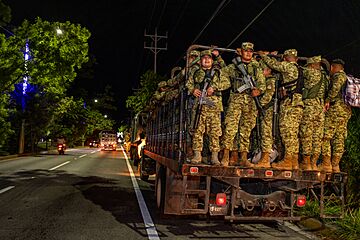
Bukele also ordered the construction of a huge new prison called the Terrorism Confinement Center (CECOT). It can hold 40,000 inmates and is one of the largest prisons in the world. By June 2024, it held over 14,500 inmates.
By March 2025, over 85,000 suspected gang members had been arrested. This has made El Salvador's prison population the highest in the world. While human rights groups have raised concerns about arbitrary arrests and conditions, many Salvadorans support the crackdown.
Political Changes
In February 2020, Bukele faced a political crisis when he ordered soldiers into the Legislative Assembly. He wanted lawmakers to approve a loan for his security plan. The lawmakers did not approve the loan that day.
In the 2021 elections, Bukele's Nuevas Ideas party won a large majority in the Legislative Assembly. On 1 May 2021, the new legislature voted to remove the five justices of the Supreme Court and the attorney general. They were replaced by people who supported Bukele. This move was criticized by some as a "power grab."
In June 2023, Bukele proposed reducing the number of municipalities (local governments) in El Salvador from 262 to 44. He also proposed reducing the number of seats in the Legislative Assembly from 84 to 60. He said these changes would make the government more efficient. The Legislative Assembly approved both proposals, and they took effect on 1 May 2024.
COVID-19 Pandemic Response
In March 2020, Bukele declared a nationwide quarantine to fight the COVID-19 pandemic. He later imposed a 30-day national lockdown. During the lockdown, thousands of people were arrested for breaking the rules. Human rights groups criticized these arrests.
Bukele opened the Hospital El Salvador in June 2020. It was the largest hospital in Latin America built just for COVID-19 patients. It later began treating other conditions. El Salvador received many COVID-19 vaccines, mostly donated by the United States and China.
Economy
Bitcoin Adoption
In June 2021, Bukele announced that he would make bitcoin legal tender in El Salvador. He said it would create jobs and help more people use financial services. The Legislative Assembly approved the law three days later.
On 7 September 2021, El Salvador became the first country to make bitcoin a legal currency, alongside the United States dollar. The government also bought its first 200 bitcoins. Bukele later announced plans to build Bitcoin City near a volcano. This city would use geothermal energy to power bitcoin mining and would have no income tax.
By March 2024, Bukele stated that El Salvador had made a 50-percent profit from its bitcoin investments. However, in March 2025, The Economist reported that El Salvador's bitcoin experiment had brought more costs than benefits. In December 2024, the International Monetary Fund (IMF) agreed to a loan for El Salvador. In January 2025, the Bitcoin Law was changed to remove bitcoin's status as legal tender, but it can still be used for payments.
Economic Plan
After his second inauguration, Bukele said his next term would focus on improving the economy. In July 2024, he announced a six-phase Economic Plan. This plan includes setting up food distribution centers and removing taxes on some farm imports. It also involves building data centers and modernizing ports.
In September 2024, Bukele stated that his 2025 government budget would not include new debt for daily spending. In October, El Salvador restructured some of its debt, saving money that would be used to protect the environment. In November 2024, Bukele supported mining gold in El Salvador, and the Legislative Assembly repealed a mining ban in December 2024.
Foreign Policy
Bukele has changed El Salvador's foreign policy in some ways. He does not recognize Nicolás Maduro as the president of Venezuela. He also condemned the results of the 2021 Nicaraguan election.
In March 2024, Bukele offered to send a mission to Haiti to help with its gang problems. In October 2024, El Salvador agreed to send soldiers to Haiti as part of an international security mission.
Relations with the United States
Bukele has had a complex relationship with the United States. In September 2019, he met with then-U.S. President Donald Trump to discuss immigration. In February 2021, U.S. President Joe Biden did not meet Bukele when he visited Washington, D.C.
Some U.S. politicians have criticized Bukele's government, while others, especially Republicans, have supported his anti-crime policies. In February 2025, Bukele offered to accept non-Salvadoran deportees from the United States, including some convicted prisoners.
Relations with China
In 2018, El Salvador ended its diplomatic ties with Taiwan and recognized the People's Republic of China. In December 2019, Bukele met Chinese president Xi Jinping and signed a large agreement for infrastructure projects. China has helped build the National Library of El Salvador and the National Stadium of El Salvador.
In November 2022, El Salvador and China began talks for a free trade agreement. China has also donated fertilizer and wheat flour to El Salvador.
Anti-Corruption Efforts
In September 2019, Bukele created an anti-corruption commission called CICIES with the Organization of American States (OAS). However, he ended the commission in June 2021.
On 1 June 2023, Bukele announced a "war against corruption." He said his government would build a prison for people convicted of white-collar crimes, similar to the CECOT prison for gang members. He also announced that assets from former Salvadoran president Alfredo Cristiani were being seized as part of this campaign.
2024 Re-election Campaign
In September 2021, the Supreme Court of Justice ruled that the president could serve two terms in a row. This decision allowed Bukele to run for re-election in 2024. Many constitutional lawyers criticized this ruling, saying it went against El Salvador's constitution.
On 15 September 2022, Bukele announced he would run for re-election in 2024. He said that "developed countries have re-election" and El Salvador should too. He registered his candidacy with Nuevas Ideas in October 2023.
On 30 November 2023, the Legislative Assembly gave Bukele and Vice President Ulloa a leave of absence to focus on their campaign. Claudia Rodríguez de Guevara, Bukele's presidential secretary, became the temporary president.
Bukele won re-election on 4 February 2024, with 84.65 percent of the vote. He was the first Salvadoran president to be re-elected since 1944. His party, Nuevas Ideas, also kept its large majority in the Legislative Assembly.
Personal Life
Family
Bukele married psychologist and ballet dancer Gabriela Rodríguez in 2014. They have two daughters, born in 2019 and 2023.
Wealth
According to the Salvadoran government, Bukele's monthly presidential salary was $5,181 in July 2019. He had a net worth of about $2.5 million at that time, mostly from his business ventures before politics. He also owns a coffee farm and launched his own coffee brand in July 2024.
Religion
Bukele's religious beliefs have been discussed by the public. He does not identify with any specific religion but has stated that he believes in God and Jesus. He has referred to the Bible and called himself an "instrument of God."
Political Views
When he was mayor of Nuevo Cuscatlán, Bukele described himself as part of the "radical left" because he wanted "radical changes" for El Salvador. He believed in social justice and that the government should ensure health, education, and good infrastructure for its people.
Since becoming president, Bukele has said he does not follow any specific political ideology. He has criticized both the political left and right in El Salvador. Some journalists and political experts have described him as a populist or a conservative. He has received support from conservatives in other countries for his anti-crime policies.
Bukele is also a supporter of Central American reunification. He believes that the countries of Central America should unite into "one single nation." He has signed agreements with Guatemala to remove border restrictions and promote tourism.
Honors
Beijing International Studies University gave Bukele an honorary doctoral degree in December 2019. In 2021, Time magazine named him one of the world's 100 most influential people.
Foreign decorations
Electoral History
| Year | Office | Party | Main opponent and party | Votes for Bukele | Result | Swing | Ref. | |||||||
|---|---|---|---|---|---|---|---|---|---|---|---|---|---|---|
| Total | % | P. | ±% | |||||||||||
| 2012 | Mayor of Nuevo Cuscatlán | FMLN | Tomás Rodríguez | ARENA | 2,862 | 51.67 | 1st | N/A | Won | Gain | ||||
| 2015 | Mayor of San Salvador | FMLN | Edwin Zamora | ARENA | 89,164 | 50.38 | 1st | N/A | Won | Gain | ||||
| 2019 | President of El Salvador | GANA | Carlos Calleja | ARENA | 1,434,856 | 53.10 | 1st | N/A | Won | Gain | ||||
| 2024 | President of El Salvador | NI | Manuel Flores | FMLN | 2,701,725 | 84.65 | 1st | +31.55 | Won | Hold | ||||
Images for kids
-
Then-mayor Bukele with President Salvador Sánchez Cerén of the FMLN, May 2015
-
Bukele with Argentine president Javier Milei in September 2024
-
Bukele and U.S. Secretary of State Marco Rubio in February 2025
See also
 In Spanish: Nayib Bukele para niños
In Spanish: Nayib Bukele para niños
 | DeHart Hubbard |
 | Wilma Rudolph |
 | Jesse Owens |
 | Jackie Joyner-Kersee |
 | Major Taylor |


